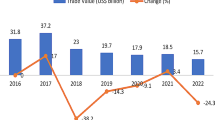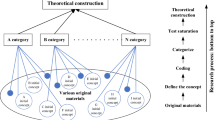Abstract
Mountain regions and peripheral communities, which often depend on few economic sectors, are among the most exposed and sensitive to climate change. Governance of such socio-economic-ecological networks plays a strong role in determining their resilience. Social processes of governance, such as collaboration between communities, can be systematically assessed through the existence and strength of connections between actors and their embeddedness in the broader socio-economic network by social network analysis (SNA). This paper examines how network governance of the tourism industry–dependent Swiss Gotthard region relates to resilience to climate change by SNA. The paper argues that economic diversification and a network structure supporting stability, flexibility, and innovation increase regional resilience to climate change. The Gotthard network has a high diversification capability due to high cohesion and close collaboration, limited innovative capacity by the existence of only two subgroups, and considerable flexibility through the centralized structure. Main weaknesses are a low density, uneven distribution of power, and a lack of integration of some supply chain sectors into the overall network.








Similar content being viewed by others
References
Adger WN (2000) Social and ecological resilience: are they related? Prog Hum Geogr 24(3):347–364
Adger W, Dessai S, Goulden M, Hulme M, Lorenzoni I, Nelson D, Naess L, Wolf J, Wreford A (2009) Are there social limits to adaptation to climate change? Clim Chang 93(3):335–354
Baggio R (2011) Collaboration and cooperation in a tourism destination: a network science approach. Curr Iss Tour 14(2):183–189
Baggio R, Klobas J (2011) Quantitative methods in tourism: a handbook, vol 48. Channel View Books, Bristol
Baggio R, Scott N, Cooper C (2010) Improving tourism destination governance: a complexity science approach. Tour Rev 65(4):51–60
Beniston M (2007) Entering into the “greenhouse century”: recent record temperatures in Switzerland are comparable to the upper temperature quantiles in a greenhouse climate. Geophys Res Lett 34(L16710):5
Bodin Ö, Crona B (2009) The role of social networks in natural resource governance: what relational patterns make a difference? Glob Env Chang 19(3):366–374
Bodin Ö, Norberg J (2005) Information network topologies for enhanced local adaptive management. Environ Manag 35(2):175–193
Bodin Ö, Crona B, Ernstson H (2006) Social networks in natural resource management: what is there to learn from a structural perspective? Ecol Soc 11(2):253–274
Burt RS (2002) Bridge decay. Soc Netw 24(4):333–363
Burt RS (2005) Brokerage and closure: an introduction to social capital. Oxford University Press, Oxford
Cash DW, Adger NW, Berkes F, Garden P, Lebel L, Olsson P, Pritchard L, Young O (2006) Scale and cross-scale dynamics: governance and information in a multi- level world. Ecol Soc 11(2):258–274
ClimAlpTour (Alber KAM, Balbi S, Bausch T, Benati A, Bonzanigo L, Cetara, LCC, Clivaz C, Colson A, Cremer I, Dissegna M, Doctor M, Dutto E, Elmi M, Fosson JP, Frigo B, Furlani R, Gallée H, Garbellini L, Gessner S, Giupponi C, Herntrei M, Kolbeck F, Luthe T, Macchiavelli A, Matasci C, Mignone N, Moretto D, Muti S, Pasquettaz C, Pasutto I, Peters M, Peyrache-Gadeau V, Pipan P, Pozzi A, Rutter S, Scheibel C, Schuckert M, Siegrist D, Strobl A, Urbanc M, Venuta, ML, Wyss R) (2011) ClimAlpTour—climate change and its impact on tourism in the Alpine space. Final project report of the Alpine space interreg project ClimAlpTour. Založba ZRC, Ljubljana
Cooper C, Scott N, Baggio R (2009) Network position and perceptions of destination stakeholder importance. Anatol Int J Tour Hosp Res 20(1):33–45
Costa LDF, Rodrigues FA, Travieso G, Villas Boas PR (2007) Characterization of complex networks: a survey of measurements. Adv Phys 56(1):167–242
Cote M, Nightingale A (2011) Resilience thinking meets social theory: situating change in socio-ecological systems (SES) research. Prog Hum Geogr (online first)
Crona B, Bodin Ö (2006) What you know is who you know? Communication patterns among resource users as a prerequisite for co-management. Ecol Soc 11(2):654–667
Davidson-Hunt LJ (2006) Adaptive learning networks developing resource management knowledge through social learning forums. Hum Ecol 34(4):593–614
Davis GF, Marquis C (2005) Prospects for organization theory in the early twenty-first century: institutional fields and mechanisms. Organ Sci 16(4):332–343
Dawley S, Pike A, Tomaney J (2010) Towards the resilient region? Local Econ 25(8):650–667
Duit A, Galaz V (2008) Governance and complexity—emerging issues for governance theory. Governance 21(3):311–335
Duit A, Galaz V, Eckerberg K, Ebbesson J (2010) Governance, complexity, and resilience. Glob Env Chang 20(3):363–368
Ernstson H, Sörlin S, Elmqvist T (2008) Social movements and ecosystem services—the role of social network structure in protecting and managing urban green areas in Stockholm. Ecol Soc 13(2):365–386
Ernstson H, Barthel S, Andersson E, Borgström ST (2010) Scale-crossing brokers and network governance of urban ecosystem services: the case of Stockholm. Ecol Soc 15(4):568–594
Folke C (2006) Resilience: the emergence of a perspective for social–ecological systems analyses. Glob Env Chang 16(3):253–267
Folke C, Hahn T, Olsson P, Norberg J (2005) Adaptive governance of social-ecological systems. Annu Rev Environ Resour 30:441–473
Fuchs M (2004) Strategy development in tourism destinations: a DEA approach. University of Innsbruck, Innsbruck
Gibson CC, Ostrom E, Ahn TK (2000) The concept of scale and the human dimensions of global change: a survey. Ecol Econ 32(2):217–239
Grabher G (1993) The weakness of strong ties: the lock-in of regional development in the Ruhr area. In: Grabher G (ed) The embedded firm: on the socioeconomics of industrial networks. Routledge, London
Granberg M, Elander I (2007) Local governance and climate change: reflections on the Swedish experience. Local Environ 12(5):537–548
Granovetter MS (1973) The strength of weak ties. Am J Sociol 78(6):1360–1380
Gunderson LH, Holling CS (2002) Panarchy synopsis: understanding transformations in human and natural systems. Island Press, Washington, DC
Hassink R (2010) Regional resilience: a promising concept to explain differences in regional economic adaptability? Camb J Reg Econ Soc 3(1):45–58
Hirschi C (2010) Strengthening regional cohesion: local collaboration networks and sustainable development in Swiss rural areas. Ecol Soc 15(4):363–375
Ingold K, Balsiger J, Hirschi C (2010) Climate change in mountain regions: how local communities adapt to extreme events? Local Environ 15(7):651–661
IPCC (2007) Climate change 2007: impacts, adaptation and vulnerability: working group II contribution to the fourth assessment report of the IPCC, Parry ML, Canziani OF, Palutikof JP, van der Linden PJ, Hanson CE (eds) Cambridge University Press, Cambridge
Janssen MA (2007) An update on the scholarly networks on resilience, vulnerability, and adaptation within the human dimensions of global environmental change. Ecol Soc 12(2):356–381
Kelly PM, Adger WN (2000) Theory and practice in assessing vulnerability to climate change and facilitating adaptation. Clim Chang 47(4):325–352
Kelman I, Lewis J (2005) Ecology and vulnerability: islands and sustainable risk management. Int J Isl Aff 14(2):4–12
Kern K, Bulkeley H (2009) Cities, Europeanization and multi-level governance: governing climate change through transnational municipal networks. JCMS 47(2):309–332
Lebel L, Anderies JM, Campbell V, Folke C, Hatfield-Dodds S, Hughes TP, Wilson J (2006) Governance and the capacity to manage resilience in regional social-ecological systems. Ecol Soc 11(1):562–583
Linnenluecke M, Griffiths A (2010) Beyond adaptation: resilience for business in light of climate change and weather extremes. Bus Soc 49(3):477–511
Linnenluecke M, Griffiths A, Winn M (2012) Extreme weather events and the critical importance of anticipatory adaptation and organizational resilience in responding to impacts. Bus Strateg Environ 21:17–32
Little LR, McDonald AD (2007) Simulations of agents in social networks harvesting a resource. Ecol Model 204(3–4):379–386
Luthe T (2009) Vulnerability to global change and sustainable adaptation of ski tourism—SkiSustain. Report series of the Institute of Outdoor Sports and Environmental Science, vol 25. German Sport University Cologne, Institute for Outdoor Sports and Environmental Science. Umweltbeirat Deutscher Skiverband (DSV), Planegg. Stiftung Sicherheit im Skisport (SIS), Planegg. Available online at http://www.tobiasluthe.de/download/SkiSustain_download.pdf
Manring SL (2007) Creating and managing interorganizational learning networks to achieve sustainable ecosystem management. Organ Environ 20(3):325–346
Michel J (2001) Erlebnis Berg. Qualitätsanforderungen an Luftseilbahnen und ihre Dienstleistungen. Dissertation at the University of Berne. Institute for Leisure and Tourism (FIF). Berner Studien zu Freizeit und Tourismus Band 39
Martin R, Sunley P (2006) Path dependence and regional economic evolution. J Econ Geogr 6(4):395
MeteoSwiss (2011) Meteorological online data base IDAWEB from the Swiss federal office of climatology and meteorology. https://gate.meteoswiss.ch/idaweb
Newig J, Günther D, Pahl-Wostl C (2010) Synapses in the network: learning in governance networks in the context of environmental management. Ecol Soc 15(4):784–793
OECD (2007) Climate change in the European Alps, vol 1. Organisation for Economic Co-operation and Development OECD, Paris
Oh H, Chung M-H, Labianca G (2004) Group social capital and group effectiveness: the role of informal socializing ties. Acad Manag J 47(6):860–875
Olsson P, Folke C, Hahn T (2004) Social-ecological transformation for ecosystem management: the development of adaptive co-management of a wetland landscape in southern Sweden. Ecol Soc 13(2):411–423
Olsson P, Folke C, Galaz V, Hahn T, Schultz L (2007) Enhancing the fit through adaptive co-management: creating and maintaining bridging functions for matching scales in the Kristianstads Vattenrike biosphere reserve, Sweden. Ecol Soc 12(1):156–171
Ritter T, Wilkinson IF, Johnston WJ (2002) Measuring network competence: some international evidence. J Bus Ind Mark 17(2/3):119–138
Ruiz-Ballesteros E (2011) Social-ecological resilience and community-based tourism: an approach from Agua Blanca, Ecuador. Tour Manag 32(3):655–666
Sandström A, Carlsson L (2008) The performance of policy networks: the relation between network structure and network performance. Policy Stud J 36(4):497–524
Schneider K (2011) Climate change and social network functions. An evaluation of the region Disentis–Sedrun–Andermatt. Masters thesis, University of Applied Sciences HTW Chur
Seilbahnen Österreich (2005) Marketing Forum Seilbahnen Österreich. http://www.seilbahnen.at
Starik M, Rands GP (1995) Weaving an integrated web: multilevel and multisystem perspectives of ecologically sustainable organizations. Acad Manag Rev 20(4):908–935
Stoker G (1998) Governance as theory: five propositions. Int Soc Sci J 50(155):17–28
Vogus TJ, Sutcliffe KM (2007) Organizational resilience: towards a theory and research agenda. In: Donk M (ed) Systems, man and cybernetics. ISIC, IEEE international conference, Montreal, pp 3418–3422
Walker B, Salt D (2006) Resilience thinking: sustaining ecosystems and people in a changing world. Island Press, Washington, DC
Wassermann S, Faust K (1994) Social network analysis: methods and application. Cambridge University Press, Cambridge
Webb C, Bodin Ö (2008) A network perspective on modularity and control of flow in robust systems. In: Norberg J, Cumming GS (eds) Complexity theory for a sustainable future. Columbia University Press, West Sussex, pp 85–111
Weick KE, Roberts KH (1993) Collective mind in organizations: heedful interrelating on flight decks. Adm Sci Q 38(3):357–381
Weick KE, Sutcliffe KM, Obstfeld D (1999) Organizing for high reliability: processes of collective mindfulness. In: Boin A (ed) Crisis management, vol III. Sage, Thousand Oaks
Wenger E (1998) Communities of practice: learning, meaning and identity. Cambridge University Press, Cambridge
Wilbanks T, Leiby P, Perlack R, Ensminger T, Wright S (2007) Toward an integrated analysis of mitigation and adaptation: some preliminary findings. Mitig Adapt Strat Glob Chang 12:713–725
Young KR, Lipton JK (2006) Adaptive governance and climate change in the tropical highlands of western South America. Clim Chang 78(1):63–102
Acknowledgments
We woud like to acknowledge the project funding by EU Interreg ClimAlpTour and by Swiss Network of International Studies (SNIS), as well as to support by Ulrik Brandes and Bobo Nick, University of Konstanz.
Author information
Authors and Affiliations
Corresponding author
Electronic supplementary material
Below is the link to the electronic supplementary material.
Rights and permissions
About this article
Cite this article
Luthe, T., Wyss, R. & Schuckert, M. Network governance and regional resilience to climate change: empirical evidence from mountain tourism communities in the Swiss Gotthard region. Reg Environ Change 12, 839–854 (2012). https://doi.org/10.1007/s10113-012-0294-5
Received:
Accepted:
Published:
Issue Date:
DOI: https://doi.org/10.1007/s10113-012-0294-5




